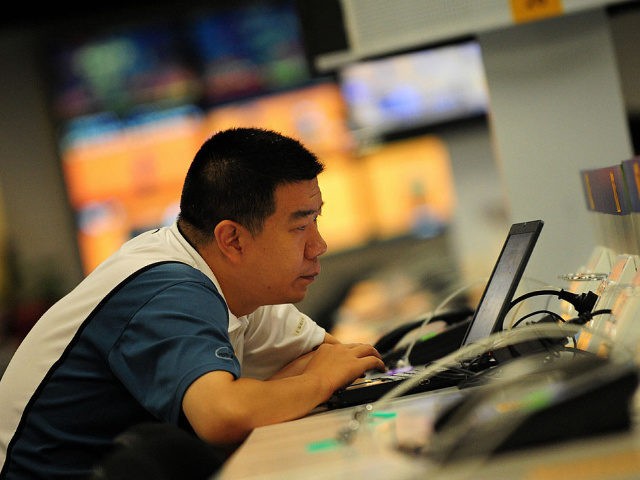China’s immense Internet censorship apparatus goes on red alert every June to stifle discussion of the 1989 Tiananmen Square massacre. The censors have been especially busy this year, the 30th anniversary of the atrocity China desperately wishes to erase from history.
PRI looked at China’s multi-layered censorship system on Tuesday and noted the first line of defense against thoughtcrime involves simply preventing Chinese Internet users from searching for topics such as “Tiananmen.”
The search engines for Weibo, China’s immensely popular answer to Twitter, bluntly inform users that searching for information about the Tiananmen Square is illegal. Sometimes a lighter touch is employed and searches for sensitive topics are redirected to harmless results. Chinese people are allowed to search for the date June 4, 1989, for example, but they will never be shown any results pertaining to the Tiananmen massacre.
At least 262 keywords related to Tiananmen have been censored, including some that would seem relatively innocuous, such as the word “candle.” (Candlelight vigils are held around the world to commemorate those who were killed at Tiananmen Square.) Even the word “today” can become a banned search term on June 4.
Numbers are also tightly policed, including various permutations of 06/04/1989, the date of the massacre. Chinese traders will actually manipulate the stock market around the Tiananmen anniversary to prevent the numbers four, six, or 89 from appearing in the indexes. When the Shanghai index fell by 64.89 points in June 2012, Beijing actually blocked searches for anything pertaining to the stock market or Shanghai for a few days.
Reuters talked to some “content screeners” working for Chinese companies who said artificial intelligence and machine learning algorithms have made censorship largely automated and incredibly pervasive. The system blocks images as well as words and numbers, often blocking even simple tourist photos of Tiananmen Square snapped by visitors who made no effort to reference the massacre.
“When I first began this kind of work four years ago there was an opportunity to remove the images of Tiananmen, but now the artificial intelligence is very accurate,” one of the content screeners said.
Companies that fail to vigorously comply with Beijing’s censorship demands can be hit with devastating penalties, while users charged with the new crime of “falsifying the history of the Communist Party” by remembering what the party wants to forget can suffer fines and jail sentences.
Chinese Internet users are not allowed to post anonymously — their accounts must be linked to verified real names and national ID numbers, and Internet providers are required to identify all users to the authorities upon demand. Reuters noted that users have been terrorized into avoiding even the most oblique references to the Tiananmen crackdown, fearing punishment for inadvertent violations of Communist speech codes.
Chinese users often use virtual private network (VPN) technology to bypass the “Great Firewall of China” and access forbidden Western websites. VPN technology suddenly becomes unreliable around the Tiananmen anniversary, while so many websites go dark that June 4 has been sarcastically nicknamed “Internet Maintenance Day.”
The BBC described China’s annual orgy of Tiananmen Square censorship as a massive act of “forgettance,” enforced by everything from automated online speech controls to thugs posted near the graves of people who died in the crackdown, to discourage relatives or other visitors from engaging in memorial actions that might illegally recall the massacre.
Chinese censors have disturbingly enlisted some Western companies for their extra-oppressive efforts on the 30th anniversary of Tiananmen Square. A financial information company partly owned by the Thomson Reuters Foundation pulled articles related to the massacre from the feeds to its data terminals in China last week. Twitter suspended numerous accounts critical of the Chinese government this week under murky circumstances and later apologized, blaming a malfunction of their own automated content control system and insisting its actions were not coordinated with the Communist government.
Chinese dissidents make efforts each year to devise coded references to Tiananmen Square that will slip past censors, a cat-and-mouse game they appear to be losing as the censorship robots grow more sophisticated and Beijing grows increasingly willing to black out everything that might be a reference to the massacre.
One dissident who decided to strike back with irresistible force is the cartoonist known as Badiucao, a famed Chinese-born underground artist with a lively social media presence who has remained anonymous for years, fearing reprisals against himself or his family by Chinese Communist agents. On Tuesday, Badiucao revealed his face to the world, inspired by the 30th anniversary of Tiananmen Square.
“I’m facing this major choice: to be silent forever, or to fight back, to confront, face to face, this situation. By stepping out on the anniversary of the Tiananmen massacre I don’t think there’s any better time for me to do that,” he told Reuters in a telephone interview from his home in Melbourne, Australia.
Badiucao, who is 33 years old, said he was inspired to become a political cartoonist when he saw a smuggled documentary on the Tiananmen Square massacre about ten years ago. He said he and his fellow university students had no idea the massacre had occurred before they watched the forbidden video.
Among other subjects banned by the Chinese government, Badiucao’s work has included reproducing the famous “Tank Man” image of Tiananmen Square and encouraging other artists to do likewise as a gesture of defiance. It is heartening that even China’s artificially intelligent censorship machine cannot fully suppress all memory of the massacre, and terrifying that it comes as close as it does.

COMMENTS
Please let us know if you're having issues with commenting.